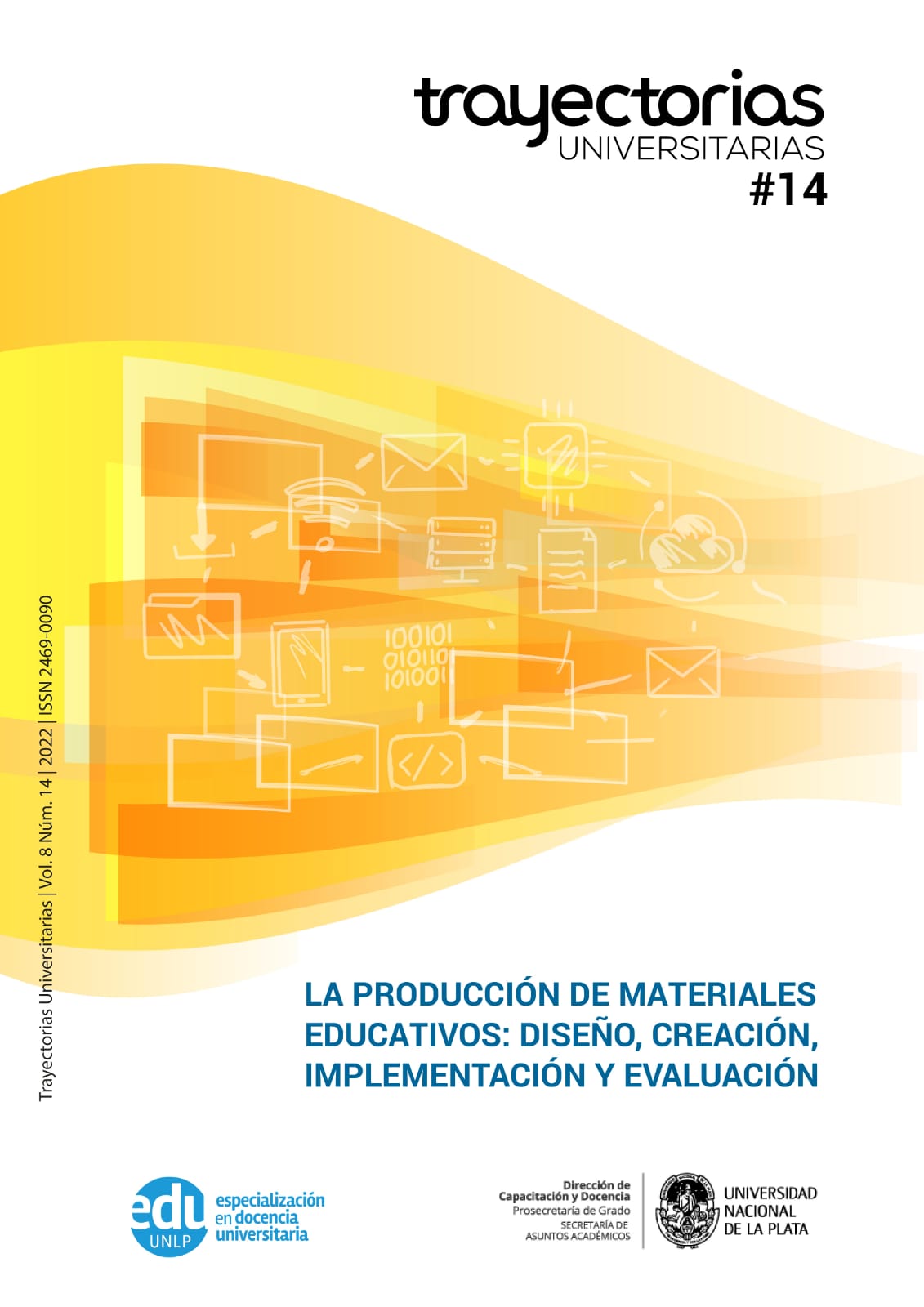Three virtual tools for collaborative learning and formative assessment
DOI:
https://doi.org/10.24215/24690090e096Keywords:
virtual tools, collaborative learning, formative assessmentAbstract
This paper aims to be a contribution to the pedagogical proposals mediated by technologies, presenting the possibilities offered by three web 2.0 tools to motivate, stimulate and facilitate interaction between students for collaborative work and, at the same time, allow the intervention of the teacher for a monitoring and assessment of the collective learning process. We propose a conceptual framework of collaborative learning, its theoretical bases and the formative evaluation of group activities. We describe the functional features of Google Drive, Miro and Mindmeister highlighting the different resources they provide. These tools are not only proposed for the purpose of technological innovation in the educational environment, but also to enhance the processes of acquiring competencies and socializing knowledge, from a socio-constructivist approach to learning. The inclusion of technologies for collaborative learning allow teachers to organize the bimodal classroom with the maximum use of virtual spaces.
Downloads
Metrics
References
Anijovich R. y Cappelletti G. (2020) La retroalimentación formativa: Una oportunidad para mejorar los aprendizajes y la enseñanza. Revista Docencia Universitaria, 21(1),81-96
Barberà E. (15-Jul-2016). Aportaciones de la tecnología a la e-Evaluación RED. Revista de Educación a Distancia. (50): 4. http://dx.doi.org/10.6018/red/50/4http://www.um.es/ead/red/50/barbera.pdf
Berrelleza Reyes C, Osuna Martínez I, Salazar Soto DY, Ruiz Xicotencatl J (Jul - Dic 2016). Estrategia colaborativa para lograr motivación y competencias en microbiología. Caso: podología UAS. Revista Iberoamericana para la Investigación y el Desarrollo Educativo 7(13), 388-405. http://www.scielo.org.mx/scielo.php?script=sci_arttext&pid=S2007-74672016000200388&lng=es&tlng=es.
Cuéllar AI (2010) ¿Cómo afrontar la evaluación del aprendizaje colaborativo? Una propuesta valorando el proceso, el contenido y el producto de la actividad grupal. Revista General de Información y Documentación, 20, 221-241
Iturrioz G., González I. (2015). Evaluar en la virtualidad. Signos Universitarios: Revista de la Universidad del Salvador, Extra n.2, 133-144.
Galindo Rodríguez, RM, Galindo González L, Galindo González N., Martínez de la Cruz N., Ley Fuentes MG., Ruiz Aguirre EI., Valenzuela González, E. (2012). Acercamiento epistemológico a la teoría del aprendizaje colaborativo. Apertura 4(2), 156-169
Gros B., Silva J. (2006). El problema del análisis de las discusiones asincrónicas en el aprendizaje colaborativo mediado. RED. Revista de Educación a Distancia, 16. http://www.um.es/ead/red/16
Lipsman Marilina (2014) El enriquecimiento de los procesos de evaluación mediados por las TIC en el contexto universitario, Revista Iberoamericana de Evaluación Educativa, 7(2), 215-222. https://repositorio.uam.es/bitstream/handle/10486/661857/RIEE_7_2_18.pdf?sequence=1&isAllowed=y
Maldonado Pérez Marisabel (2007). El trabajo colaborativo en el aula universitaria. Revista de Educación, Año 13, 23, 263-278
Martín MM., Romanut LM. (noviembre, 2017). Experiencias docentes en el proceso de evaluación: re-significando las herramientas de la virtualidad. [Ponencia]. Jornadas de TIC e Innovación en el Aula, La Plata. http://sedici.unlp.edu.ar/handle/10915/65774
Restrepo Zea CM., Atuesta Venegas MdelR. (2007). Hacia una comunidad educativa interactiva. 1 ed. Editorial Universidad EAFIT: Medellín, Colombia.
Roselli, Néstor D. (Ene.-Jun. 2016). Propósitos y Representaciones, 4(1),219-280. http://dx.doi.org/10.20511/pyr2016.v4n1.90
Silva, M. E. (2020). Características de las herramientas multimedia para el desarrollo de Presentaciones Interactivas. Journal of Science and Research: Revista Ciencia e Investigación, (I Congreso Internacional de Investigación, Innovación y Gestión del Conocimiento), 5(Extra 1), 873-891
Downloads
Published
How to Cite
Issue
Section
License
Copyright (c) 2022 Karina Inés Schmidt, Anabel Mariela González, Adrián Alejandro Abal, Andrea Tanevitch

This work is licensed under a Creative Commons Attribution-NonCommercial-ShareAlike 4.0 International License.
La aceptación de un original por parte de la revista implica la cesión no exclusiva de los derechos patrimoniales de los/as autores/as en favor del editor, quien permite la reutilización, luego de su edición (postprint), bajo una Licencia Creative Commons Atribución-NoComercial-CompartirIgual 4.0 Internacional (CC BY-NC-SA 4.0).
Acorde a estos términos, el material se puede compartir (copiar y redistribuir en cualquier medio o formato) y adaptar (remezclar, transformar y crear a partir del material otra obra), siempre que a) se cite la autoría y la fuente original de su publicación (revista y URL de la obra), b) no se use para fines comerciales y c) se mantengan los mismos términos de la licencia.
La cesión de derechos no exclusivos implica que luego de su edición (postprint) en Trayectorias Universitarias los/as autores/as pueden publicar su trabajo en cualquier idioma, medio y formato; en tales casos, se solicita que se consigne que el material fue publicado originalmente en esta revista.
Tal cesión supone, también, la autorización de los/as autores/as para que el trabajo sea cosechado por SEDICI, el repositorio institucional de la Universidad Nacional de La Plata, y sea difundido en las bases de datos que el equipo editorial considere adecuadas para incrementar la visibilidad de la publicación y de sus autores/as.
Asimismo, la revista incentiva a los/as autores/as para que luego de su publicación en Trayectorias Universitarias depositen sus producciones en otros repositorios institucionales y temáticos, bajo el principio de que ofrecer a la sociedad la producción científica y académica sin restricciones contribuye a un mayor intercambio del conocimiento global.















